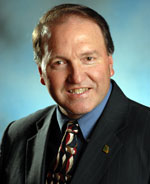 The world’s self-proclaimed leader in natural and organic grocery sales has earned special recognition form the Environmental Protection Agency. The EPA has awarded Whole Foods Market its Green Power Partner of the Year award for the second consecutive year, recognizing the grocer’s leadership in accelerating the development of new renewable energy capacity nationwide.
The world’s self-proclaimed leader in natural and organic grocery sales has earned special recognition form the Environmental Protection Agency. The EPA has awarded Whole Foods Market its Green Power Partner of the Year award for the second consecutive year, recognizing the grocer’s leadership in accelerating the development of new renewable energy capacity nationwide.
This is the fourth consecutive year Whole Foods Market has been recognized with a Green Power Leadership Award by EPA, after being recognized initially in 2004 for the company’s growing commitment to green power purchasing.
 In 2007, Whole Foods Market is being recognized for increasing its green power purchasing to include more than 509 million kilowatt-hours of wind-based renewable energy credits. This is enough renewable energy to offset 100 percent of the electricity used in all of its stores, facilities, bake houses, distribution centers, regional offices and global headquarters in the U.S. and Canada. Whole Foods Market is the only FORTUNE 500 Company to offset 100 percent of its electricity use with renewable energy credits.
In 2007, Whole Foods Market is being recognized for increasing its green power purchasing to include more than 509 million kilowatt-hours of wind-based renewable energy credits. This is enough renewable energy to offset 100 percent of the electricity used in all of its stores, facilities, bake houses, distribution centers, regional offices and global headquarters in the U.S. and Canada. Whole Foods Market is the only FORTUNE 500 Company to offset 100 percent of its electricity use with renewable energy credits.
The release also mentions Whole Food’s committed effort to reduce its carbon footprint by fueling the grocer’s trucks with biodiesel at four of the company’s nine distribution centers.


 Coal-based electricity is emerging as a qualified energy source for one concerned group as the nation heightens its energy awareness. The
Coal-based electricity is emerging as a qualified energy source for one concerned group as the nation heightens its energy awareness. The  The American Soybean Association (ASA) is raising concerns about the level of government funding to alternative energy sources, particularly biodiesel, in the Senate’s version of the Farm Bill.
The American Soybean Association (ASA) is raising concerns about the level of government funding to alternative energy sources, particularly biodiesel, in the Senate’s version of the Farm Bill. Among those testifying before Rep. Edward J. Markey’s (D-Massachusetts) committee, musician Adam Gardner (left) of the band Guster… founder of the non-profit group “Reverb” which has helped other bands, including the Barenaked Ladies, the Dave Matthews Band, Alanis Morrisette, John Mayer, Norah Jones, The Fray, and the Red Hot Chili Peppers green up their tours.
Among those testifying before Rep. Edward J. Markey’s (D-Massachusetts) committee, musician Adam Gardner (left) of the band Guster… founder of the non-profit group “Reverb” which has helped other bands, including the Barenaked Ladies, the Dave Matthews Band, Alanis Morrisette, John Mayer, Norah Jones, The Fray, and the Red Hot Chili Peppers green up their tours. Dale Ludwig, chief executive officer of the Missouri Soybean Association, said the facility planned in Moberly “will pretty much do it” for the construction of Missouri plants given statewide soybean production. He said statewide biodiesel production is expected to peak at about 200 million gallons a year once all proposed plants are up and running.
Dale Ludwig, chief executive officer of the Missouri Soybean Association, said the facility planned in Moberly “will pretty much do it” for the construction of Missouri plants given statewide soybean production. He said statewide biodiesel production is expected to peak at about 200 million gallons a year once all proposed plants are up and running. Ethanol interests are hoping that Congress might finally get the energy bill into conference committee this week.
Ethanol interests are hoping that Congress might finally get the energy bill into conference committee this week.  Meanwhile, the Senate Agriculture Committee is finally scheduled to mark up a farm bill Wednesday morning, with chairman Tom Harkin announcing agreement on structure last week.
Meanwhile, the Senate Agriculture Committee is finally scheduled to mark up a farm bill Wednesday morning, with chairman Tom Harkin announcing agreement on structure last week.  Florida Agriculture and Consumer Services Commissioner Charles Bronson has announced
Florida Agriculture and Consumer Services Commissioner Charles Bronson has announced  GE Energy will provide Third Planet Windpower with 167 1.5 megawatt wind generators for wind farm projects in Texas, New Mexico, Nebraska and Wyoming that will be ready for turbines in 2009.
GE Energy will provide Third Planet Windpower with 167 1.5 megawatt wind generators for wind farm projects in Texas, New Mexico, Nebraska and Wyoming that will be ready for turbines in 2009.  Palm Tran, with its 9-10 million riders a year, will switch its 115 buses to biodiesel in a few months.
Palm Tran, with its 9-10 million riders a year, will switch its 115 buses to biodiesel in a few months.